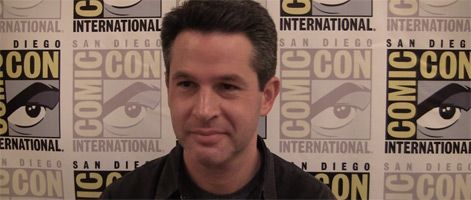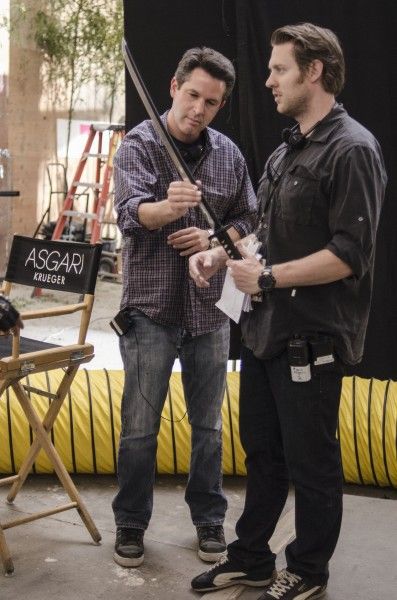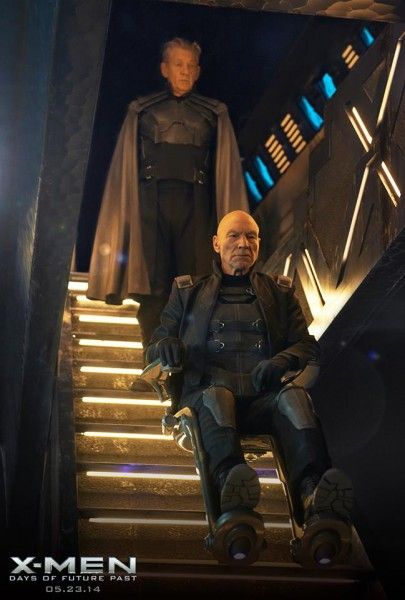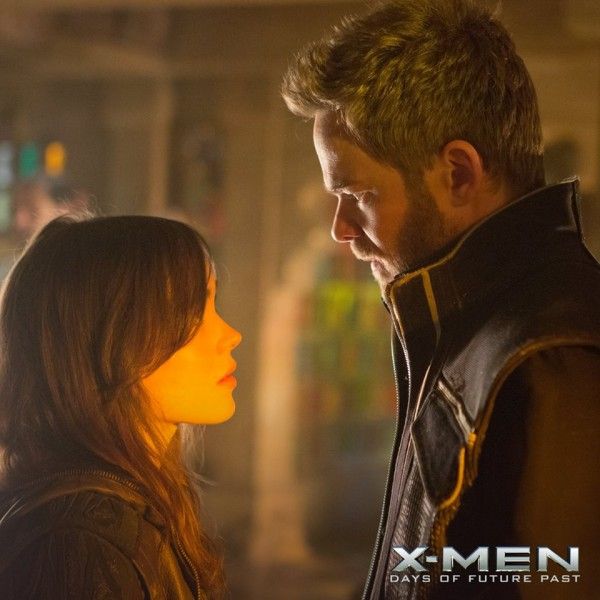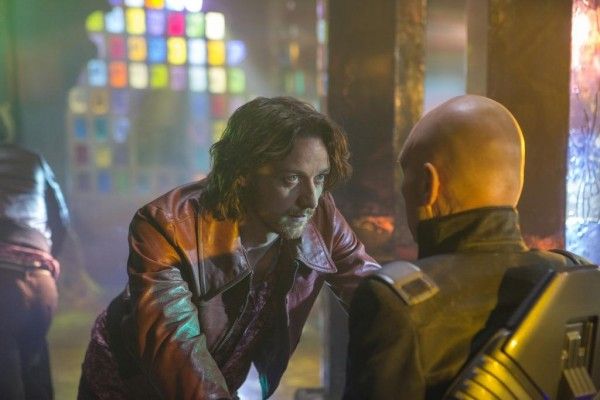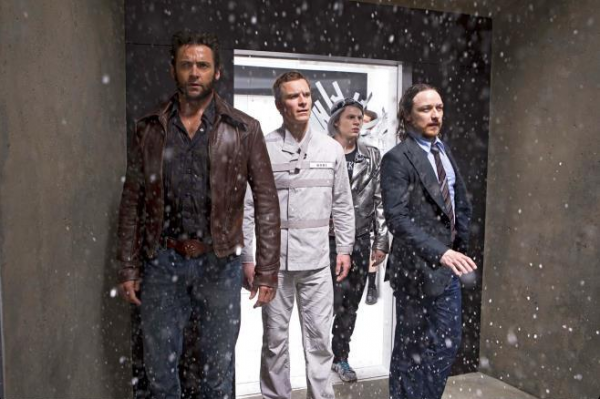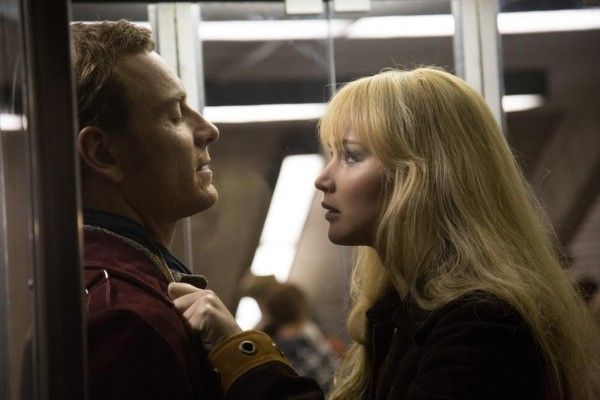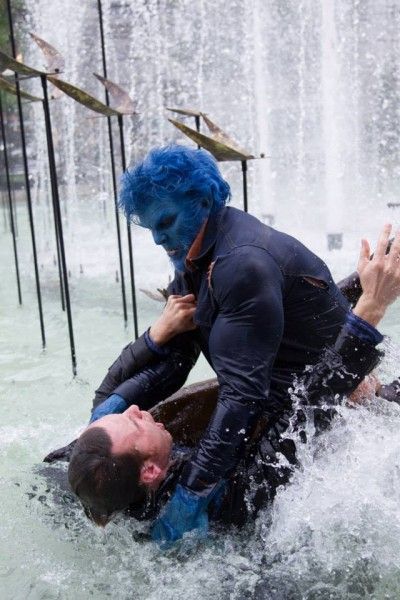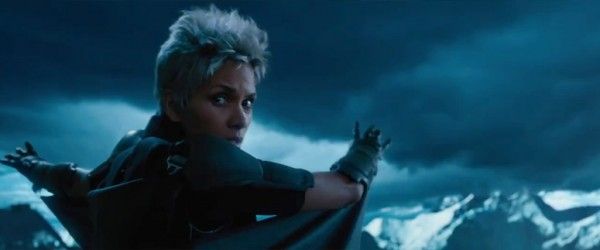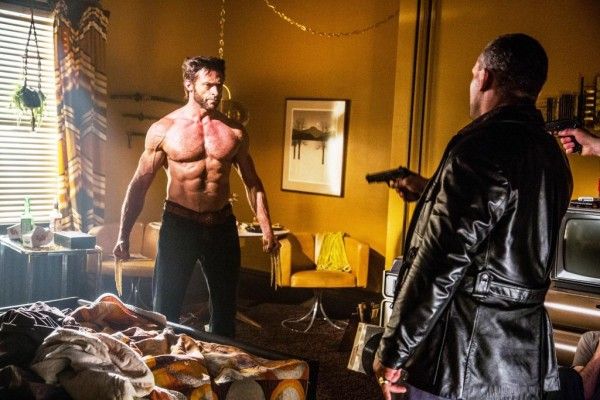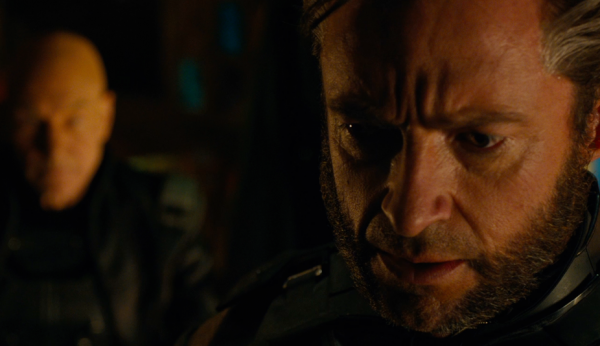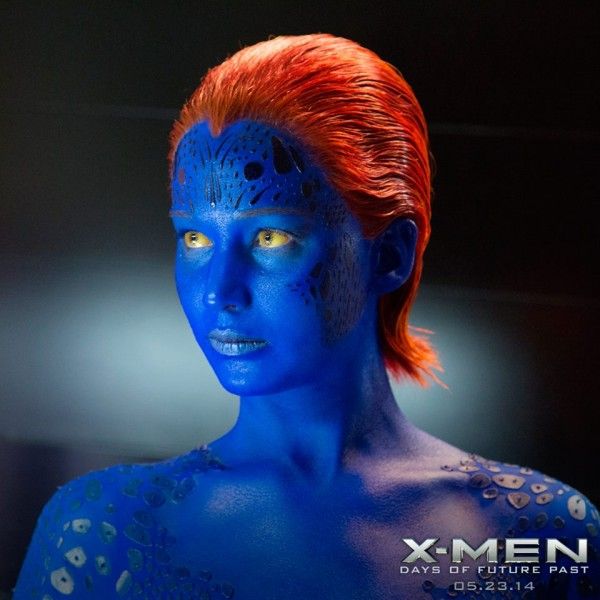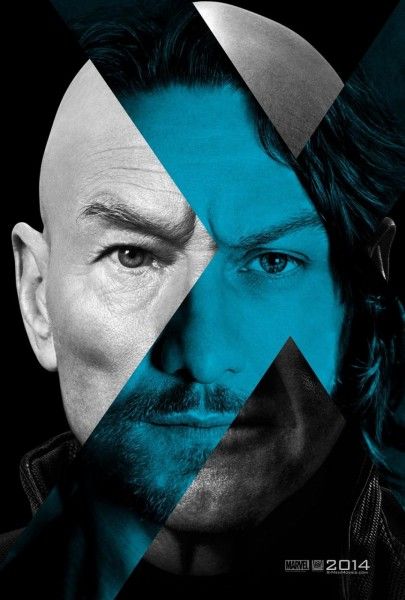20th Century Fox owns many of my favorite Marvel characters. Since Marvel has done such an amazing job combining their various characters across their movies, I was wondering when Fox might do something similar with the ones they own. During a group interview with writer-producer Simon Kinberg on the set of X-Men: Days of Future Past last summer, he revealed the studio was finally thinking about it:
"Fox is a very different place than it was when I made X-Men 3 there. And it's been evolving since X3 to First Class to this, and there's no question that the Marvel model has influenced and inspired them. We approached this movie from the standpoint of what to do with the universe rather than what to do with the story. We talked about other Marvel properties at Fox and talked a lot about what the future stories would be, whether they followed the cast in the future or the cast in the past and they're all about trying to do what Marvel's done and create different platforms for different stories."
During the rest of the great interview, Kinberg talked about the evolution of the script, time travel, changes from the comic storyline, the X-Men franchise, having both casts in the film, the challenges of scheduling the various actors, how he approached the Sentinels, and so much more. Hit the jump for what he had to say.
Click here to listen to the audio from this interview. The full transcript is below.
Question: So this is the moment where you tell us everything.
SIMON KINBERG: Oh yes, sorry. Well, we can just flip through the script together, page through it, go straight to the ending.
Oh well, all know the ending, come on now. It's on that piece of paper over there.
KINBERG: Oh, very nice! You don't need me then. If you know everything already, I'm not gonna give you anything.
The interesting thing about Bryan is...
KINBERG: There are many interesting things about Bryan.
Exactly. But we've heard that he will maybe shoot what's on the page and then maybe shoot something a little different. Talk about the way he works and how the script has possibly changed along the way or during production.
KINBERG: It is a fluid process with Bryan. He came on to the movie, he was always the producer, but he came on as the director when Matthew Vaughn fell out of the movie, which you know. In, I guess, it would have been October of 2012. I already had probably the second draft of the script done. Bryan and I spent October, really November and December revising the script together. He had mostly notes about character, and he was really focused on making the time travel element as logical and scientifically sound as possible given the fact that it's not real. And then once we got up here, which was February or so, and we started shooting in March/April, he is... and this is the way I've worked too... very open to new ideas, whether they be a week before or on the day, whether they come from me or another producer or the actors. It keeps the scenes fresh, it helps the movie evolve as ideas evolve and I think the basic architecture remains the same, there aren't big, sweeping, architectural narrative changes, it's just texture, dialogue, little character moments and ideas that we discover, mostly probably with the actors. So yeah, we shoot what's on the page and then we muck around a little bit with the actors and see if we can try to come up with something better.
Does the fact that they're all pretty well versed in these roles make that easier?
KINBERG: Well, I've done it on a lot of movies. Two of the first movies I worked on were with Doug Liman, and Doug as a director is famous for, we'd spend three or four hours each morning re-writing before we ever got a shot off. Which he would call the workshop process. Bryan's not that loose and improv-y, but the fact that these actors have played the characters at least once, and in the case of the original cast, three and in Hugh's case five times before, they come with a lot of ideas and the truth is, as the writer of the movie, it's very hard for me to track... the biggest challenge is not the storytelling, it's to track every character's arc through the entire movie. Because you've got really eight or 10 main characters. Ordinarily on a movie you have maybe two or three, so we have 10 or more and we've trusted the actors to police their characters and to track their arcs not for us, but with us. And sometimes they have a slightly different perspective or a lot of the time they just have a nuance, a detail, a piece of texture that I may not have, because I'm not inside in the same way they are, but also in the sense that I have to balance all these characters and all these stories. And the action and things that the actors aren't burdened with.
We've heard this described as almost two discreet movies that come together. Is that how you look at it?
KINBERG: Not really. I mean, they are two separate time periods, they, for the most part, two separate shooting periods, because we had the original cast for the first month and a half or so and then we transitioned into the First Class cast with, obviously Hugh being the overlap between the two. But unlike, I think, most other time travel movies, and I studied a lot going into this, we intercut between the two time periods, so there is a relationship between the two periods narratively and then just experientially, you're not leaving the future to go to the past and never coming back the way you do in Back to the Future or The Terminator movies, this is a much more interconnected, interwoven two time frames, so I didn't think about it as two discreet stories because in writing it, I was having to weave them together.
What are the time travel movies that seemed the most significant to you?
KINBERG: Those two I mentioned, I mean Back to the Future and the first two Terminator movies were the ones that I studied the most, they also just happen to be my favorite time travel movies. But the logic is so sound in those movies and in both cases those franchises are built around character and that's the thing I really wanted to focus on, to use time travel to tell character stories as opposed to just do it for a science fiction purpose, so I was looking at how the time travel in those films forces those characters to evolve, that the break in the space-time continuum is just an excuse for telling a character story and this franchise is obviously a very character driven franchise, so I didn't want it to suddenly become this sort of plot driven, purely science fiction movie. So the first Back to the Future and the first two Terminators were what I studied and studied. And actually I had this crazy experience, I don't know if it was a month ago or a year ago, the last few months all blur together, but I think it was two months ago, Fox Corporation, News Corp, did a corporate retreat in Laguna. I was on a panel speaking with James Cameron and I had a book that was The Making Of Terminator 2, from a long time ago, it's a 30-year-old book and brought it with me for Cameron to sign. I'd never met him before and I was in awe of him and I was, like, "will you please sign this, Terminator 2 is in the top five movies of all time for me' and I said, "we're doing Days of Future Past and there are some people who think it influenced Terminator and now Terminator, at least for me, influenced this movie..." He said, "Sure, I'll sign it." He just wrote in it, 'Don't fuck it up. Love, Jim.' Pretty great.
Was there ever a point where you scripted this around Kitty Pryde, rather than Wolverine?
KINBERG: No, because by the time I was actually scripting, I'd gone through quite a bit of conversation with Matthew and the studio and a couple of iterations of outlines, so when you start thinking about the original story and sending Kitty back in time, unless you recast Kitty in the future as almost Ian and Patrick's age, she's negative five years old in 1970-wherever it is in the past. So sort of quickly we felt like it wasn't going to be Ellen/Kitty and then, frankly, the immediate and most natural candidate, not because he's the star of the franchise, but because he is ageless, so he'd look the same as an actor in 1973 as he would in the future, was Hugh. And then we started to build more mythology and more logic around why he would be the one to be sent back in terms of it being difficult to send somebody back this far and it would be destructive to the body, so he's the only person who heals, and all of the things that suddenly lined it up as him being the natural person to send back. And he's the only person, only actor who was in the original movies and had a cameo in First Class. So it just kept paying dividends back.
As you were saying about this as a character piece is the character at the center rather than it being Wolverine's story, is this really Xavier's story?
KINBERG: Yep. That was something that, after First Class, the studio obviously, as with all these kinds of movies, wanted to do a sequel and we knew that we probably would unless it was a disaster, which it wasn't, and Matthew Vaughn and I spent a lot of time talking about what the sequel would be, and our initial ideas were not to bring in the original cast or even to bring in Hugh, it was just to continue the story that we'd set up from X-Men: First Class. And from the very beginning, the only thing we knew was that in some ways First Class was Erik/Magneto's origin story. You start with a guy who is by himself and you end with a guy who is putting together the brotherhood and says, "I prefer Magneto." And this would be, we just felt, because of where Charles ends the last movie, losing so much that the most dramatic story would be Charles' story and his origin, in some ways, of becoming Professor Xavier. So then a lot of things evolved and eventually it became Days Of Future Past, but from the beginning all the way to the end - the end being this week (laughs) - it was really telling the story of Charles Xavier, and he's the protagonist of the movie. He may not have the most lines in the movie, but he's the protagonist.
And that bit we saw in the Comic-Con clip where he seems to be rejecting this heroic role.
KINBERG: Totally. When he starts this movie, he is as far from the Charles Xavier that we've seen in the movies, in some ways I think, as any iconic character that becomes a hero. He's wallowing in self-pity, essentially doing drugs, Unshaved, walking around, broken, Born on the Fourth of July kind of character and obviously, like any great actor, James was really excited about that. One of the fun things was on Michael's first day on set, we were shooting a scene where James and Michael had not seen any of the movie yet, he was literally showing up on set for the first time. James is shooting a scene, and Michael was sitting next to me at the video village and he was watching James, saying, "Hhm... Hhm..." He'd read the script, obviously, but he hadn't seen that James had a beard and scraggly hair and Michael said, "Oh, so he gets to play the angst in this movie..." So he is a dark, broken, as far as you can get from heroic character at the beginning. And then, ideally by the end obviously, not to ruin it, but he becomes more heroic.
Talking about the angle of where the characters are in 1973, did you have a roadmap for points between First Class and Days Of Future Past, where you can tell the actors, "you did this, this and this, and now you are here" so they refer to something but not necessarily have it scripted?
KINBERG: Yeah. One of the things, and this is an idea that came out of my work with Matthew Vaughn was, we didn't want to do what most sequels do, which is pick up a day after or a month, or even a year after the last movie. We wanted to give it a big breadth of time so that you would meet these characters in some ways for the first time again, so we set the movie 10 years later than First Class ended and in doing that, part of my responsibility as the writer was creating a timeline so we can do exactly as you said, just give the actors a sense of who they've become and how they got there over the span of the 10 years we haven't seen. And there's a monologue in the movie that Hank has that Nick has, where he tells Wolverine essentially what happened. Wolverine comes to the mansion, he meets this broken, disheveled Charles Xavier and he says, "What happened to the Professor?" And Nick tells him what happened. "We started a school, it fell apart, he fell apart..." And all the things that happened over the last 10 years.
If I'm not mistaken, we see Charles walking around in the plane, which is maybe a little different to how the last movie ended.
KINBERG: You're not mistaken. I don't think it'll be a spoiler, I think it'll be something that'll be in trailers that he is walking around. And that's a huge part of the arc for him, accepting, in some ways embracing the chair, as opposed to being condemned to it. It's something that by the end of the movie he's really taken his place in. I'm not to talk much about this, but it's in the Hank/Charles relationship that they've discovered a way to help him walk, but at the cost of other things. And over the span of the film, he embraces those other things and lets go of his legs.
Have you ever met Chris Claremont and talked to him about this movie?
KINBERG: Yeah. I've met him a couple of times. I met him on X-Men 3, because he did a cameo in that movie. And he actually wrote the novelization of that film and named a character in the novelization after me, which is one of my proudest things. And then he came up here, and I think people know this, he cameoed in this film, so we spent a day together and we talked through the changes that we'd made to the original story and he was really supportive about it.
There are lots of smaller, lesser-known characters you're introducing here like Sunspot or Blink, is that with an eye towards the future or is it serving a purpose?
KINBERG: It would be nice to incorporate them into future movies. It's interesting to think about what the future of the X-Men world would be, because we now have these two separate timelines. We have the original cast in the future essentially and we have the past, younger cast. But no, it wasn't really built for future movies; it was that they serve a narrative purpose within the film. When we meet some of our characters in the future, it tells the story of mutant refugees and so we wanted to populate that with characters that the fans would recognize and potentially would be intriguing enough that they'd want to follow into who knows what- maybe it's movies, maybe it's a television show, maybe it's their own anime, it could go in a lot of different directions these days, there are so many different types of media that it would be cool if a movie that has this many characters could actually take advantage of a different media.
Is there a sense in Fox that there's a willingness to do that? You can't approach a movie like this, now, post-Marvel Phase One without thinking, 'well, how do we integrate them all?'
KINBERG: Yeah, Fox is a very different place than it was when I made X-Men 3 there. And it's been evolving since X3 to First Class to this, and there's no question that the Marvel model has influenced and inspired them. We approached this movie from the standpoint of what to do with the universe rather than what to do with the story. We talked about other Marvel properties at Fox and talked a lot about what the future stories would be, whether they followed the cast in the future or the cast in the past and they're all about trying to do what Marvel's done and create different platforms for different stories. But understanding that the tapestry of that before I'm writing rather than having to put things together after I'm writing.
Does that give you new and unusual constraints as you're writing, thinking, 'well, this is not necessarily just its own thing' but has to link forward as well as back?
KINBERG: No, it didn't really feel like a constraint, it was fun because it felt like the comics. In the comics you could go any different direction with different stories and incorporate different characters and drop characters for stretches of time, so it felt like we were doing something that was more akin to creating comic books than one-off movies. And they're so supportive and open now - I've never had an experience, especially on a movie like this, that's this big, a franchise, a title, this big a swing, because of using all the casts and science fiction elements, it's a big movie, the studio has just been so supportive and open and trusting and maybe that's because it's me and Lauren and Matthew and Bryan, who've all had some experience and success in this world, but they've been really cool. We're doing some pretty radical things in this film, such as the Charles characterization, some of the things we do in this movie are not necessarily for my four-year-old son, they're darker and more ambitious and provocative.
Would you say this is the most fun you've had, writing this script?
KINBERG: Yeah, it is, actually. And partly it's been so much fun because being on set with these actors, they're so good. And forgetting if they're stars or not, they’re just technically so good as actors, so to see them speaking lines and then to have an environment where they're open, the director's open, we're all collaborating all the time and it's just a very alive process, yeah, it's the most fun I've had as a writer.
When the new cast signed on for First Class, everyone has to sign multi-picture deals and I'm not sure if they signed a three-picture deal or if the Marvel six-picture deal, but I'm just curious about that contract and what the actors originally signed, because let's be honest, Michael Fassbender is a way bigger star now.
KINBERG: Jennifer Lawrence was an unknown when we cast her in First Class and she's the biggest female movie star in the world right now.
Exactly. So the question becomes, the studio if they have them under a three-picture deal, then obviously they want to make a three-picture, it's like a guarantee. So I'm just curious how that contact impacts which characters you can have more shit happen to...
KINBERG: Well, they do have multi-picture deals with the cast, that's part of any of these movies now. It was part of the original movies - they had multi-picture deals with Hugh and Halle and Famke [Janssen] and Jimmy [Marsden] and those guys, so this is no different than that. I don't know what the nature of the deals are in terms of how much they get paid and whatnot, and I think usually what happens in these kinds of movies as it has on the Marvel films is when somebody gets exponentially bigger as an actor and their fee gets exponentially larger than what it was originally, there's some sort of settlement between the actor and the studio. They don't pay them what their current fee is, but there's some sort of settlement. So I genuinely don't know how the money worked out on this film...
That's nobody's business, but I'm curious that if they have a three-picture option, that means they can put them in three movies.
KINBERG: Well, they can. The funny thing about this franchise is we killed Patrick Stewart in X-Men 3 but you saw him in the Comic-Con reel. We killed Famke in X3, but she showed up in The Wolverine.
And that made The Wolverine a better film, because that cameo had a lot of closure.
KINBERG: Yeah, I think so too. So at any rate, as a creative person, I don't really think about how many pictures we have for them, because I also assume that if it's wildly successful, they'll just do what they did with Hugh and pay the actors a shitload of money to get them in a fourth and a fifth movie. They had Hugh for three movies and they burned one of those on a different film, so they essentially had him for two movies and they've been paying him tons of money for the three or four since. So no, there is a natural gravitation towards the characters that become more interesting because of the actors that play them. So Jen is a fantastic actress and I wanted to write more for her to do and explore, performance-wise, in this film. She's maybe a more prominent character in this movie than she was in First Class because she proved herself as something special in that film. Same for Nick, same for Michael, though he was obviously very prominent in First Class. So I guess I just, when I feel like there's an actor that I feel is really interesting, and just as a fan, I want to see them explore more colors then maybe some of the other actors that maybe don't feel like they're as multi-dimensional.
We heard there were a lot of time constraints with certain actors, like Halle Berry was only available for two days, or Anna Paquin for a week, is that something that you knew going into writing the script, or was that last minute adjustments?
KINBERG: Halle was longer than that. But there were time constraints and we had schedule constraints with a lot of actors, like even Peter Dinklage, who we had a lot of time with, we had to get him out by a certain point for Game Of Thrones. There was a certain amount of it that I assumed going into the film, I knew we weren't going to have Halle for run of show, so I didn't write a ton for her to do. So there were things like that. And then, once the schedules and the contacts got done, and I knew what I'd have, especially Anna and Halle for, I did adjust the script for their schedules. But not much for Anna and only, I think there's one scene that I cut out that would've made Halle's schedule tougher. But those were the only ones - we had Ian and Patrick for a long stretch. And the interesting thing about the future period is, originally it was conceived not as Days Of Future Past, it was because Matthew and I in working on the movie felt like it needed to have bookends that were Patrick and Ian. They just were going to be stand-alone scenes that weren't going to be connected to the past, there wasn't going to be any time travel. And then we started saying, "Wouldn't this be interesting if it was kind of like Godfather II" where you're intercutting and seeing backstory and future story and then, one day, I was with Matthew and I said, "Have you read Days Of Future Past." He said, "I think I know that. I've seen the cartoon..." Like Bryan, actually, he was really raised on the X-Men cartoons, and he asked me for more details. All of a sudden it was, "Oh shit... we should be telling this story." But the thing that immediately was apparent was, can we make that movie? Because they had to make all new deals with Ian and Patrick and Halle and all these people, and Hugh, and can we afford to make this movie or is it prohibitively expensive? And the studio figured out a way to make it and gave us a healthy budget so we were able to, but it wasn't Days Of Future Past. It really went from two little scenes to a few more scenes to, maybe we should do Days Of Future Past... Can we? And then Hugh shall we send back in time? It evolved.
So you pushed that?
KINBERG: I'd say I brought it up. It didn't need much pushing because once everybody sort of wrapped their heads around what it was, everybody got excited about it, creatively, and then practically it was, “We can't make a $500 million movie, so can we do it?” And schedules. From the beginning, it was, “How do we get all these people together for a finite amount of time?”
How long was your first draft?
KINBERG: It wasn't that long. I thought I would have a lot of issues with length because of the story. I write every first draft - almost every draft - but certainly the first - by hand on blank white pieces of paper, so I don't know how long it is as I'm writing, it just piles up and then I input it all in my computer and I learn how long it is. I think the first draft was a 140-something pages, which is long, but isn't terrifying. And then I spent a week and trimmed it down and I think the first draft I gave Matthew was somewhere in the 130s, and by the time we were shooting it was in the 120s. And if you add up all the little bits and pieces and additional moments it's back up in the 140s or 50s, but it'll be a two-hour movie.
I was going to say, this is a huge story. Is there ever any thought about the length. After two hours with certain audiences, it becomes a question of audience fatigue, so in the back of your mind thinking two hours is ideal?
KINBERG: It depends. I love the Dark Knight movies and Dark Knight and the last one are well over two hours, and I could've sat there for three and a half hours, so if it's good you have some leeway. I don't know. I don't really think about it, to be honest. We have a lot of drama in this movie, I would say there's more dramatic, face-to-face shit's-not-exploding dialogue scenes in this film than in any other X-Men movie. In fact, I know there are, even more than First Class, which was a pretty dramatic film. So that will slow the movie down a little bit, because those dialogue scenes, there are a bunch of four-five minute dialogue scenes on a film like this. It's a long period, you have eight minutes before you have to blow something up again, so I think it will have the feel of, I hope, a more sophisticated, mature movie, which maybe can support a two-plus hour run time, but I don't think about it when we're shooting. I'll think about it when we have the director's cut or the assemblage and it's four hours long...
Did you have anything to do with the post-credits tag for The Wolverine?
KINBERG: Yeah, I wrote it. The studio was talking about wanting to do a tag for Wolverine and Emma Watts, who is president of production at Fox and I are really close and she said, "Shall we do something for Days Of Future Past?" And I told her for sure we should and then Bryan and I started to riff on what that scene could be and kind of wrote it together, I suppose. I've known Jim Mangold for a long time, I rewrote a movie of his a few years ago and I called Jim and he got involved and me, him and Bryan all monkeyed around with it together and he came up here on a Saturday, shot with our actors on a Sunday and with our crew - a couple of his key crew, but mostly our crew. I was there on set and Bryan came by as well and it was really fun. But yeah, it was a scene that I came up with and wrote.
Will that lead into the movie or was it to whet our appetite?
KINBERG: Just meant to whet appetites. Because this movie takes place, the Patrick/Ian part, in the future, and that scene is more in the present, so it was meant to just do what it did and tease this movie. And when you meet those characters in this film, they're on the other side of something that there's only the hint of in the tag.
Can you talk about Trask and the Sentinels at all and how you approached the Sentinels?
KINBERG: I think I can. It was obviously a huge part of the movie. Trask is the villain of the film, and the Sentinel program is the thing that they're sent back in time to stop, you've read the comics, you know that. And we're loyal to that. Part of what was really fun about this, and it's just separate that it happens to be this story, is when I was working on X3 and First Class, we were trying to find ways to incorporate Sentinels into the movies - I know they did it in X2 as well and dropped it in X3, they have a little not-so-awesome moment with the Sentinels, that doesn't take full advantage of them. So once we all committed to Days Of Future Past, and knew the Sentinels would be a part of it, and Trask would be central to the story, Bryan has done a lot of things to make the Sentinels feel loyal to the books but also distinct from all the things that are ripped off the Sentinels, like all the other robot movies that have come in the last 15 years or so, so they look and feel different. And Bryan spent a lot of time working on them to make them feel period specific but also cool and what a kid would fantasize about.
You mentioned X3 and working with the history of the movies, you're re-writing your own timeline, considering the scene where Charles and Erik collect Jean and Xavier's walking. Are you aware of stuff you have to be careful of, and maybe in the future you're writing X-Men 59 and change things around again.
KINBERG: Yeah, I was there for those and was aware of it. My crazy experience with the X-Men movies is, I came on to X-Men 3 because Bryan Singer left it. And Matthew Vaughn was going to direct X3, then Matthew left and Brett [Ratner] directed the movie. Then First Class came along and Bryan was going to direct it for a moment then Matthew came on, then he was going to direct Days Of Future Past and he left and Bryan came back, so I have an arc from Bryan to Bryan over the span of 10 years. So I'm very aware of the lineage outside the frame and story-wise, and this is an opportunity, when you send somebody back in the past, it's to change the future, so that is the goal of the movie, to change the future and in doing so, potentially change X1-3. There's a part of me that says I can right some of the wrongs we might have done in X3.
The Quantum Leap of screenwriting.
KINBERG: Yeah! I just get to keep having another crack at it, it's like re-writing.
So Scott Bakula is Cyclops.
KINBERG: (Laughs) That I can't say. But I am going to be working on the next X-Men movie and I was writing this and as especially as it's been evolving as we’re shooting, thinking about what's the next story to tell. Not even from a narrative standpoint, but from a character standpoint. Like, what's the next stage in evolution for, no pun intended, these characters, and one of the things that's really cool is, there is this big, open time frame between First Class and Days Of Future Past and the original actors, so there's this still 30-year period where we can fill in a lot of the blanks and show how, even after this movie, they still evolve from where Charles and Erik and Raven and Hank end this film to the ones we meet 30 years later. So I had a lot of different graphs and grids and shit up on my bulletin board when I was writing this, a lot, actually, because I was keeping all the characters straight and the arcs straight and then I was keeping the narrative straight, and then when things in the past impacted the future, so there was that whole thing to keep straight. And I had a whole grid that was from First Class to X-Men 3 and the Wolverine movies and I was very aware of where things began and where they could potentially deviate.
Amongst all the various people who are making the decisions as you're going forward, is there any thought to any more stand-alone character movies?
KINBERG: We've talked about it and I know that Fox would be interested in more movies. But I don't think there has been any evolved conversations about it, it's just if there are ideas for character spin-offs. One of the things that was a really cool script, and you can't do it, because we did it in First Class, was the Magneto stand-alone.
Did First Class leap off of that?
KINBERG: According to the Writers Guild it did! So I can say that. But we told the Magneto origin story in First Class and that's what that film did. It took place, I believe, right after World War II, so he was younger and the story was different, and obviously our film was in the '60s, but yeah, that's one you couldn't tell anymore. But you could follow Raven, you could follow Charles or Erik in their own movie, there are a lot of possibilities.
So it's a question of, for an audience, do these characters work better as a team surrounded by others?
KINBERG: I feel like they do. But that's just because I grew up... Actually, there are plenty of spin-offs in the comics, but I grew up on the team. So I think the thing that's so special about this particular franchise, as distinct from Superman, Batman, Iron Man, these other movies that are "Man" singular, is that it's "Men" plural and you get the sense that it's this dysfunctional family and these disparate people who are outcasts in their own lives and they come together and there's something about an outcast on their own that's somehow not quite as, at least for me, emotionally satisfying. But having said that, I thought the last Wolverine movie was really good and that's him on his own, essentially, and I think these characters are super intriguing, and it would certainly be a hell of a lot easier to write, to just tell one story. It's my dream now, just to do that. But my favorite movies growing up were ensemble movies. The reason I wanted to work in movies was the Star Wars films, and you have a lot of characters to service in those. And a lot of really iconic, great characters that could justify their own spin-offs, but George kept together in one universe.
Until now.
KINBERG: Yes, until now!
Do you know what you're going to do after this? Just a long vacation?
KINBERG: No vacation. I'm going to work on the next one of these, I'm working on a Star Wars movie.
Really? I've never heard about that...
KINBERG: Yeah. And helping out on Episode VII and a couple of things I'm producing, like Neill Blomkamp's next film, that shoots this fall.
Chappie?
KINBERG: Chappie, yeah. And also producing a different kind of movie, Disney's Cinderella, which starts shooting a week after we wrap this. So I'm gonna take four days on a beach in Mexico and then go right back into it.
For more from my X-Men: Days of Future Past set visit:
- 90 Things to Know About Bryan Singer's X-MEN: DAYS OF FUTURE PAST From Our Set Visit
- Hugh Jackman Talks Reuniting with Bryan Singer, Battling Sentinels, How Long He'll Play Wolverine, and More on the Set of X-MEN: DAYS OF FUTURE PAST
- James McAvoy Talks Hanging Out with the Cast, His Scene with Patrick Stewart, Professor X's Hair, and More on the Set of X-MEN: DAYS OF FUTURE PAST
- Director Bryan Singer Talks Bringing Back the Original Cast, Sentinels, Shooting in 3D, Time Travel Mechanics, and More on the Set of X-MEN: DAYS OF FUTURE PAST
- 5 New Images From X-MEN: DAYS OF FUTURE PAST Feature Jennifer Lawrence, Peter Dinklage, Michael Fassbender, Hugh Jackman and More

